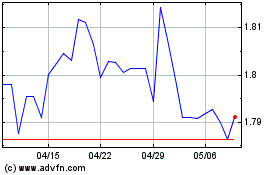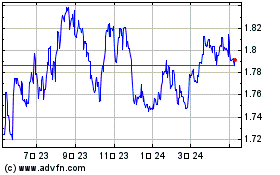Euro Up As ECB Praet Says Signs Of Inflation Converging Towards Target Improved
The euro gained ground against its major counterparts in the
early European session on Wednesday, after the European Central
Bank Executive Board member Peter Praet said that the Governing
Council would decide next week regarding whether sufficient
progress have been met to warrant a gradual wind down of net
purchases.
Praet said that signals showing convergence of inflation towards
the 2% target have improved and the Governing Council would discuss
about a gradual unwinding of the net purchases next week.
"Signals showing the convergence of inflation towards our aim
have been improving, and both the underlying strength in the euro
area economy and the fact that such strength is increasingly
affecting wage formation supports our confidence that inflation
will reach a level of below, but close to, 2% over the medium
term," Praet said at the Congress of Actuaries, in Berlin.
He said any decision concerning the termination or further
extension of net purchases will hinge on the ultimate judgement of
the Governing Council.
Praet noted that low interest rates fundamentally reflect the
consequences of unfavorable secular trends, combined with the
fall-out from the global financial crisis and euro area sovereign
debt crisis.
Meanwhile, European stocks were broadly higher, with technology
and commodity-related stocks leading the gainers.
The upside remained capped somewhat amid concerns that big
spending plans and other changes proposed by the new coalition
government in Italy will increase the country's debt burden.
The euro rose against its major counterparts in the Asian
session, with the exception of the pound.
The euro advanced to a 9-day high of 1.1599 against the franc,
2-week highs of 1.1771 against the greenback and 129.58 against the
yen, off its early lows of 1.1528, 1.1711 and 128.59, respectively.
The euro is poised to challenge resistance around 1.17 against the
franc, 1.18 against the greenback and 131.00 against the yen.
The euro rose to 0.8767 against the pound and 1.5239 against the
loonie, reversing from its early lows of 0.8738 and 1.5154,
respectively. On the upside, 0.89 and 1.53 are likely seen as its
next resistance levels against the pound and the loonie,
respectively.
The single currency hit a 5-day high of 1.6722 against the kiwi,
after having fallen to 1.6621 at 2:45 am ET. The next possible
resistance for the euro is seen around the 1.68 level.
Data from Statistics New Zealand showed that New Zealand total
building activity fell a seasonally adjusted 0.9 percent on quarter
in the first three months of 2018.
That was well shy of forecasts for an increase of 0.5 percent
following the downwardly revised 1.0 percent gain in the previous
three months.
The 19-nation currency appreciated to 1.5392 against the aussie,
after dropping to 1.5283 at 1:30 am ET. The euro is seen finding
resistance around the 1.55 region.
Data from the Australian Bureau of Statistics showed that
Australia's gross domestic product rose a seasonally adjusted 1.0
percent on quarter in the first three months of 2018.
That exceeded expectations for an increase of 0.8 percent
following the 0.4 percent gain in the previous three months.
Looking ahead, U.S. and Canadian trade data for April, Ivey PMI
for May and Canada building permits for April are scheduled for
release in the New York session.
At 11:00 am ET, the Bank of England member Ian McCafferty will
discuss the economic outlook and monetary policy in a phone-in
interview conducted by Iain Dale on LBC Radio.
Euro vs NZD (FX:EURNZD)
FXチャート
から 3 2024 まで 4 2024

Euro vs NZD (FX:EURNZD)
FXチャート
から 4 2023 まで 4 2024
